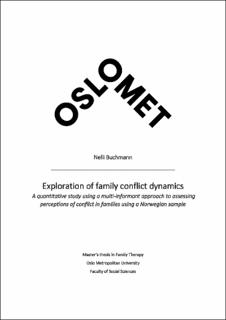| dc.description.abstract | Previous studies have investigated interparental conflict (IPC) and its influence on family relationships and child development from parents’ point of view. Even though systemic theory emphasises the interrelatedness of family members and family processes, little to no research in this field has been based on both children’s and parents’ reports, and no study before has applied the Social Relations Model (SRM), a well-suited method for investigating complex social phenomena, to family conflict. Aiming for a more holistic understanding of family conflict dynamics, the present study used multi-informant measures and applied SRM analysis. The two research questions asked concern individual, relational and family level differences in the perceptions of conflict between two and two family members (RQ1) and the associations between parent and child perceptions of IPC and parental conflict resolution, respectively (RQ2).
Data were drawn from Wave 1 of the FamilieForSK study, a longitudinal survey study from the Norwegian Institute of Public Health (Folkehelseinstituttet). The sample in the present study comprised 599 families consisting of mothers, fathers and children aged 6-16.
The results were mainly consistent with previous research on IPC and with patterns from previous SRM-studies from different research fields. The results highlighted, amongst other things, the importance of relationship-specific characteristics for parent perception of IPC, as well as the importance of child characteristics for both parent and child perceptions of parent-child conflict.
This study contributes to a more nuanced understanding of the agreement and disagreement between parents and children in terms of their perception of both IPC and parental conflict resolution. The implications of this study for practitioners underscore the importance of taking into account child-characteristics when working with parent-child conflict, focussing on the relationship-level when working with IPC plus generally paying attention to child appraisals of IPC or parental conflict resolution as these might differ from the parents’ appraisals. | en_US |
